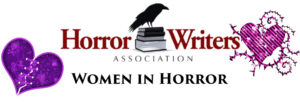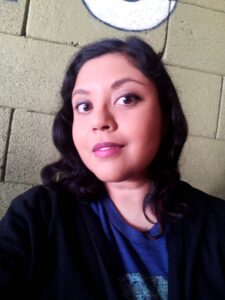Women in Horror: Interview with Premee Mohamed


Premee Mohamed is a Nebula, World Fantasy, and Aurora award-winning Indo-Caribbean scientist and speculative fiction author based in Edmonton, Alberta. She is an Assistant Editor of the short fiction audio podcast Escape Pod and the author of the Beneath the Rising series of novels as well as several novellas. Her short fiction has appeared in many venues and she can be found on Twitter at @premeesaurus and on her website at www.premeemohamed.com.
What inspired you to start writing?
I’ve always loved telling stories—I think that’s a very clichéd thing to say but it’s often true of writers. We like seeing the shape of things or hidden inside things. So I basically started writing stories as soon as I started reading, and realized what stories were. I wanted to write stories different from the ones I was seeing (which is the kind of hugely egotistical take you can only get from a very young kid who doesn’t realize just how many stories are out there before they came into the world).
What was it about the horror genre that drew you to it?
For books, it was definitely a way to explore ideas and emotions I never saw anywhere else. Growing up, I read a lot but it seemed like other genres (thrillers, suspense, sci-fi, fantasy) sometimes drew close but then veered away at the last minute instead of looking directly at the subject. I like that good horror isn’t coy, doesn’t flinch. It explores pain, grief, catharsis, disgust, guilt, cruelty, and above all fear in a way that feels intense and powerful. It can say out loud, “Feel this” instead of, “Think about this.”
Do you make a conscious effort to include female characters and themes in your writing and if so, what do you want to portray?
I do try to, and this is an interesting question because it made me stop and think about the word ‘consciously.’ I think when I was younger and first reading horror, a lot of the women kind of fell into buckets that felt boring to me… they were victims of abusers or killers, they were sad ghosts, they were overprotective or hysterical mothers. Half the time they were just a walking womb (“Pregnancy is scary!”) or collection of orifices (“Sex is bad!”). And it all felt very predictable to me. If a named woman showed up on page ten, I knew that she’d become a love interest by page twenty-five and then would be hacked apart at about the midpoint, to spur the male hero to do something drastic. I liked the idea of the ‘final girl’ but I also hated that even in that case, the female character is usually in opposition to, and therefore defined by, the male villain. I want to write female characters in horror who haven’t lost all their agency by the end of the book, who are able to make ‘the best bad decision’ they can make, who aren’t just trying to fulfill male expectations for the whole story. I don’t write many female villains but I would like to write more; I want to explore themes of power and evil and ambition and indifference outside of a strictly ‘nurturing’ framework of mother/wife female expectations.
What has writing horror taught you about the world and yourself?
Definitely that there are still fears I want to probe in my writing that I’m currently shying away from, and not just in writing but life. Sometimes I look at them and I think… I’ve been pushing these away and compressing them so fiercely that they’re like a star now, and if I grab it I will hurt myself. So for now, I’m too afraid of the pain I expect from doing that. But I want to at some point, because I think horror is a good home for honesty. It’s the genre of unvarnished emotions, of showing human nature at its rawest and least prettied-up. I want to ask myself not “What are you afraid of?” but “If you’re not lying to yourself, what are you afraid of?” and allow that to show in my writing. And as for the world… I think this is the truth about everyone. We all have that star inside ourselves and we all want to look away from it.
How have you seen the horror genre change over the years? And how do you think it will continue to evolve?
I think I’ve definitely seen horror change for the better, in fiction at least. (I don’t watch a lot of horror movies because they’re too scary, haha.) I’m seeing a lot of horror that nods to its roots and plays with the old, pulp tropes around vampires and zombies and werewolves and whatnot, but there’s also so much good new horror exploring other ideas, settings, themes. There’s a whole world of things to scare us aside from monsters and serial killers! I’m also glad to see fewer books relying on the “Oh look, the villain is fat or disabled or has a mental illness or a facial difference or is from another country” etc. That was old a hundred years ago. We can do so much better than relying on stereotypes. (Unfortunately, those are still out there; just this week I’ve spotted new releases prominently featuring misogyny, fatphobia, and racism.) One thing I’m enjoying at the moment is the upsurge in authors who are highlighting social horrors, if you can call it that. Systems and hierarchies and capitalism and corporations as the villain, as the newest things to fear and hate, I love that. To me it’s another kind of cosmic horror: we root for the heroes because it seems like their enemies are simply too big to fight.
How do you feel women have been represented thus far in the genre and what hopes do you have for representation in the genre going forward?
I think representation is improving, for sure. Especially as I see more and more women, especially BIPOC women, writing horror and contributing their voices to the mix. For a while there I felt like horror was very much a white, male game. Or anyway those were the books I was seeing most publicized. Now there’s a wealth of horror that’s interesting and complex and highlights women in a variety of roles. I for sure would love to see more women writing horror from non-Western experiences and mythologies especially, and my hope is that we see a flood of those books alongside the ones aimed at North American and British readers.
Who are some of your favorite female characters in horror?
I don’t watch much TV but I loved the smart, indomitable Alexandra Trese from the Trese Netflix series. Dana Mills in Maria Dahvana Headley’s The Mere Wife is incredible; it’s a Beowulf retelling so of course there has to be a ‘villainous’ mother figure but Dana is so complicated and compelling, and she carries and causes so much trauma, I felt like she was a real person. Jane Lawrence in Caitlin Starling’s The Death of Jane Lawrence—ditto—someone who’s terrified but does what she has to do despite a really horrifying situation. Just an incredible demonstration of willpower and determination in a story world that flat-out admits that it doesn’t take women seriously.
Who are some women who write horror you recommend our audience check out?
Definitely Suzan Palumbo; I’m very excited about her upcoming short story collection Skin Thief. Nadia Bulkin and her short story collection She Said Destroy is also fantastic, and a couple of the stories straight-up gave me nightmares. Caitlin Starling I already mentioned but let me just say her next book, Last to Leave the Room, is going to make people’s heads explode. Silvia Moreno-Garcia (several of her books) and I’m also going to add Isabel Yap’s collection Never Have I Ever on here even though I don’t think it was billed as horror? It does contain some stories I would absolutely consider horror though, and it was very good.
What is one piece of advice you would give horror authors today?
Don’t sand down your writing because you think a gatekeeper will like it better! Readers truly do want horror with edges sharp enough to cut.
And to the women who write horror out there who are just getting started, what advice would you give them?
Read lots of horror being published now! Pick up the award-winning anthologies and collections for the last few years. Even if you’re writing something based on an older form (ghost story, fairy tale, myth retelling), you will find hundreds and hundreds of amazing stories that are newer, fresher, and better examples of what’s selling right this minute, and that’ll help you train your intuition when you’re reading your own stuff.



